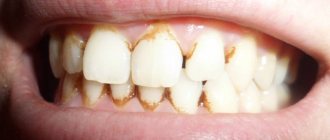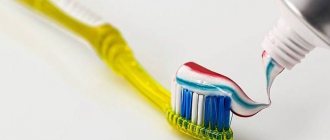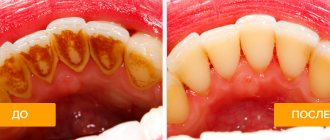October 21, 2018
Everyone who regularly visits a dental office has an idea of what oral sanitation is. This is a set of measures whose main goal is to prevent the development of any dental diseases. Oral sanitation also allows you to improve the health of your teeth and gums, restore their functionality and beautiful appearance if necessary. The procedures will help get rid of pathogenic microflora, all kinds of foci of infection that can affect not only the teeth, but also penetrate inside the body.
What procedures are included in the complex of oral cavity sanitation?
The editors of the UltraSmile.ru portal suggest not to ignore this topic, but to understand in as much detail as possible all the nuances of oral sanitation. This will be very useful for enriching your horizons and will help you understand exactly when a useful event may come in handy.
What is oral sanitation and what procedures does it consist of?
Sanitation of the oral cavity is a set of measures aimed at treating diseases of this area (teeth, gums, tongue, mucous membranes) or preventing their occurrence, as well as eliminating various pathologies (congenital or acquired).
The complex of these measures includes the following procedures:
- treatment of caries (including complicated ones that have progressed to pulpitis or periodontitis). This is the most frequent therapeutic intervention, since almost 90% of the population suffers from dental caries, and also because it is with minor destruction of the enamel that large and intractable problems begin - diseases of the dental roots, infectious lesions of hard and soft tissues, destructive lesions leading to loss of functional units,
- treatment of periodontitis. This is a disease that affects various structures around the tooth root. The danger is that during inflammation, the infection can spread not only to neighboring teeth, but also to the bone, and even to other organs of the head - eyes, ears, sinuses,
- treatment of tooth enamel destruction (including hypoplasia). The enamel covering the crown performs a protective function, so any violation of its integrity threatens damage to softer and unprotected tissues. Depending on the diagnosis and the degree of development of the pathology, the doctor builds a treatment strategy - from the use of remineralizing pastes to installing crowns on the affected teeth.
- treatment of inflammatory processes of soft tissues of the oral cavity. These can be diseases of the gums, tongue, oral mucosa, palate and larynx. Therapy tactics are built depending on the diagnosis and individual factors of the patient’s condition (heredity, pregnancy, the presence of other diseases that provoke inflammation in the oral cavity, bad habits, etc.),
- elimination of tooth deformation (both congenital and acquired) and filling defects. Depending on the clinical picture, defects are corrected using fillings or prosthetics,
- cleaning and curettage of gum pockets. Gum pockets are called the separation of the edge of the gum from the wall of the tooth. In such depressions, as a rule, plaque accumulates, which then hardens, turning into tartar. All sorts of pathogenic microbes love to live there. Removing these deposits prevents the spread of infection and the development of many diseases,
- removal of teeth that have completely lost their functionality. The doctor resorts to this method when restoring the unit is no longer possible for some reason,
- correction of bite. This stage is very important for maintaining dental health, since malocclusion causes inconvenience not only in aesthetic terms. With various defects in the dentition, digestion and speech are affected, the process of salivation is disrupted, and there is a risk of developing caries or other infectious diseases,
- prosthetics. Replacing missing teeth is needed not only to restore the aesthetics of a smile. A complete set of teeth allows you to chew food better, improve diction, maintain the strength of the jaw bone,
- professional teeth cleaning. This set of preventive procedures includes not only the removal of plaque and tartar, but also the treatment of crowns with special restorative and protective preparations, bleaching, fluoridation, silvering (mainly for children) and other hygienic procedures.
Certificate from the dentist
Review of “Free-form doctor’s certificate”
Probably everyone has situations when they need to escape from work under a plausible pretext. So I had the same situation: friends invited me to an anniversary in another city. In general, run away n..
Review of “Certificate from physical education to school”
I was in 11th grade and at the football academy I had a hard joint and my meniscus was injured. For a very long time I tried to improve my physical condition and for this reason I decided that I didn’t need to move...
Review of “Vaccination certificate”
I have never had vaccinations because I don't trust their quality. But a certificate of vaccination was required. Ordered using this site. They issued a certificate promptly and delivered it the next day.
Review of “Medical certificate for traffic police in the Regions”
I passed my license not so long ago. It seemed half the job was done, but when it came to the medical examination, I realized that passing the license itself is not so difficult. I work every other day, so one day is off..
Indications for sanitation
- upcoming surgical treatment (even with minor interventions, such as abortion, replacement of the eye lens, removal of adenoids, etc.). This is done in order to avoid complications after surgery, because an infection from the oral cavity can enter the blood,
- entering kindergarten or school. Upon admission to an educational institution, a health card is created for each student, which indicates chronic and other diseases, and also monitors what treatment the child receives,
- before pregnancy. When planning to become a mother, women should take care of their health, since pregnancy is a serious test for the body, and the presence of infectious diseases can become a serious test for the fetus. Therefore, it is important to take preventive measures in advance,
- upcoming orthopedic (prosthetics, implantation) or orthodontic (bite correction) treatment,
- work in hazardous industries (especially those related to the chemical industry). Harsh working conditions weaken the body, so workers in hazardous professions must undergo a medical examination, and if any pathologies are detected, immediately receive medical care.
- a history of serious illness (such as diabetes, tuberculosis, rheumatological systemic diseases, etc.). Such complex diagnoses, as a rule, disrupt the functionality of many body systems, and teeth are most often the first to be affected.
- the presence of chronic or genetically determined oral diseases,
- passing the draft commission (for conscript or contract service),
- upcoming long-term business trip to places with limited medical care (for example, third world countries), expeditions, extreme hikes.
How is sanitation carried out?
This event is usually divided into three types:
- individual (is the initiative of the patient himself),
- periodic (if the patient falls into one of the groups for which undergoing sanitation is a necessity, for example, before surgery or pregnancy),
- planned (when the procedure is included in the occupational safety plan or is a prerequisite for employment).
Stages of reorganization
Stage 1: diagnostic.
At this stage, the dentist examines the oral cavity and identifies defects that need to be eliminated. In some situations, the doctor may prescribe an additional examination - tests, x-rays or ultrasound diagnostics to identify hidden problems.
Stage 2: therapeutic.
This stage is always individual. Its duration, intensity and cost depend on the identified pathologies and the choice of method for their elimination. If the condition of the oral cavity is neglected, then sanitization begins with the removal of damaged teeth, “stumps” and restoration of the gums. Next, the doctor follows the individual clinical picture,
Stage 3: preventive.
For the purpose of prevention, the doctor necessarily recommends that the patient undergo professional teeth cleaning, during which all deposits are removed, and then he applies strengthening or protective preparations to the enamel, and carries out whitening if necessary. Sometimes this stage precedes treatment and even diagnosis. This is done to make it easier to identify problems, because carious lesions and other foci of infection may be hidden under a layer of plaque. And professional hygiene reduces the risk of re-infection with caries during treatment.
Remember! You can skip the therapeutic stage if you pay due attention to oral hygiene every day, follow your doctor’s recommendations and give up bad habits. Preventing caries allows you to avoid more serious health problems and save money.
Financial benefit
Purchasing a certificate on our company’s portal is often cheaper than obtaining a document through an official examination. Having discovered foci of inflammation: caries, pulpitis, periodontitis, etc., the dentist must eliminate them. Subsequent treatment and other recovery operations will require time and money. We issue a certificate from a dentist quickly and inexpensively. The client even wins financially.
Additionally, the company provides a number of bonuses:
- free delivery to a metro station within the Moscow Ring Road for large orders costing over 3,000 rubles;
- 5% discount when purchasing two or more certificates;
- 10% discount for the “Bring a Friend” promotion.
The result is that buying a certificate from us turns out to be several times cheaper than visiting a dentist. The exception is when a visit to the dentist does not require postponement. In other cases, buy medical certificates from us. This is a guaranteed result, no expectations and maximum comfort of service.
Sanitation during pregnancy
Pregnancy is a very important period not only for the woman herself, but also for her fetus, so it is better to prepare for such an event in advance. Sanitation of the mouth at the stage of pregnancy planning is a must, because during gestation all calcium and other active substances will be sent to the development and growth of the small organism. Therefore, mom needs to take care of the health of her teeth in advance.
Sanitation of the oral cavity allows not only to treat caries, but also to strengthen tooth enamel, because it bears the main burden. The acid-base balance of saliva changes, the body as a whole undergoes hormonal and metabolic changes, and with vomit during toxicosis, gastric juice gets onto the enamel, which corrodes the enamel. That is why it is important to strengthen your teeth and get rid of all pathologies that increase the risk of developing serious diseases, such as pulpitis or periodontitis.
Important! If conception occurred unplanned, then the woman also needs to undergo sanitation, but here it is important to consult a doctor. Firstly, because in the first trimester there are restrictions on the use of various medications (and some of the drugs used in dental treatment still enter the body with saliva). Secondly, in many women, toxicosis and the gag reflex intensify, which makes it impossible to carry out manipulations in the mouth.
Contraindications
Carrying out antiseptic treatment of the external genitalia has a number of limitations. It is contraindicated in the following conditions:
- presence of allergies to drugs used during manipulation;
- menstrual bleeding;
- deterioration of the patient’s general well-being;
- bearing a child in the absence of infections.
Sanitation of the external genital organs is not recommended during the acute course of the above-described inflammatory and infectious pathologies of the genitourinary system.
Before performing the procedure, medical clinic specialists must take into account the individual characteristics of each patient’s body.
Sanitation before implantation
Installation of a dental implant is a complex surgical procedure involving the implantation of a foreign body into the jawbone. If there is some source of infection in the oral cavity (an area of carious lesions, inflammation in soft tissues, ulcers on the mucous membranes or tartar), then with a high probability this infection will penetrate into the open wound. This can lead not only to implant rejection, but also to more serious consequences - inflammation of bone tissue and even sepsis.
Therefore, before proceeding directly to installing the implant, the orthopedist directs the patient to sanitize the oral cavity in order to minimize risks.
Sanitation in pediatric dentistry
“Putting things in order” in a child’s mouth is an important detail not only in the prevention of caries. Timely sanitation allows you to quickly identify pathologies in the formation of the jaw or bite, correct them and thereby provide the child with healthy and properly functioning teeth.
As a rule, oral cavity sanitation is carried out in kindergartens and schools. Its technology is no different from that of an adult: after an examination, the doctor identifies problem areas, treats caries and carries out professional teeth cleaning. If a child has teeth that cannot be restored, they are removed.
Interesting! According to a sociological study in schools in Moscow and the Moscow region, almost half of parents of children of primary and secondary school age (48%) take their child to the dentist only when a problem arises, and 4.6% do not take their child to the doctor even if a pathology is detected. A fifth of respondents (21%) believe that it is enough to bring the child for examination once a year. And only 24% of respondents bring their children for preventive care twice a year.
Authenticity is the credo of our company
The completed form purchased from us contains all the mandatory criteria for a real certificate. We do not prepare the sample document ourselves. The company operator only accepts the order and collects the necessary information about the patient. The data is transferred to the dental department of the clinic, where the sample is filled out. The result is an absolutely authentic document, signed by a practicing dentist, certified by a valid doctor’s seal and the stamp of a medical institution.
Other beneficial aspects of cooperation with us:
- efficiency - the certificate is ready within an hour after submitting the application;
- free delivery throughout Moscow to the metro station;
- confidentiality – information received about the client is not saved;
- comfort – there is no need to actually visit the dentist’s office.
Indeed, you can buy a certificate from a dentist from us directly from home, or any other place where there is access to the Internet. Placing an order takes no more than a minute. Delivery to a specified address in Moscow is even possible. But this service is paid.











